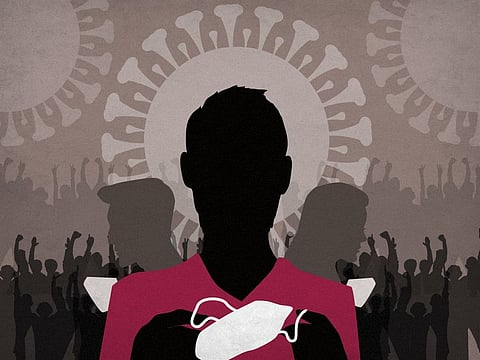Why I’m not ready to unmask
I socialise with friends who are equally careful

High school coaches often have a lot of influence on their players. At Classical High School in Providence, , my football coach was named Al Morro; he had been a national junior champion in the discus and a tough-nosed lineman on an undefeated Boston College football team, and though he has been dead for more than 16 years, I think of his words often these days.
Morro was old-school, grabbing our face masks and twisting our heads around and sometimes smacking us. I recall at one halftime he warned he’d hit us harder than any opponent.
If he sounds like a horrible man, he wasn’t. He recognised, and got us to see, that our biggest opponent in life was ourselves. If we could perform at our best, winning would take care of itself.
One Morro lesson seems particularly relevant to where we are now in the pandemic: He often said that late in a game, when both teams are tired, some players get sloppy while others somehow concentrate even more, focus more, push more — and win.
He illustrated this with film of BC playing also-undefeated Tennessee in the 1941 Sugar Bowl. Late in a tie game on a key play, Morro knocked down an All-American Tennessee lineman but threw the block too soon; the play was a slow-developing reverse, and the film showed that the lineman could have easily gotten up and stopped the run. Instead, clearly tired, he didn’t hustle and missed the tackle. Boston College scored on the drive and won.
Abandoning restrictions
Today seems much like the situation Morro often talked about. We’re all tired. More than anything, we want the coronavirus to be over. The fact that we can see the end — or, at least, what we hope will be the end — makes us that much more eager to rush to embrace it. Future variants will determine whether the end really is near; meanwhile, some US states are abandoning restrictions.
In some places, that step might be reasonable; in others, it’s premature. For that reason, what individuals do becomes more important than ever. Now is the time to focus.
I am not a perfectionist. I do not believe in the bromide that everything worth doing is worth doing well. Some things are worth doing although they are not worth the time or energy required to do them well.
But some things must be done well, and paying attention to covid is one of them.
That does not mean isolating yourself. It does not mean living in a box. It means being prudent and careful. It means, in addition to vaccination and masks, following “3 Cs” — avoid crowds, close contact and closed spaces.
One of the most important public policy questions coming out of the pandemic is how much of Japan’s comparatively “successful” handling of it is attributable to near-universal compliance with the 3 Cs, masking and selective controls, and how much is attributable to such other factors as fewer nursing homes. For me, paying attention to Covid means monitoring local conditions and adjusting.
In New Orleans, as in most other places, the omicron surge is rapidly declining, but the absolute numbers are still worrisome. For now, I don’t wear a mask outdoors. I go out for coffee every morning but sit inside only if I’m next to an open door.
I socialise with friends who are equally careful. I go to restaurants, eating outside. I even go to the gym, a high-risk activity, but I mask and exercise next to open windows. When the numbers get good enough, I’ll return to dining inside and abandon my mask indoors.
But not yet. Until then, I’m channelling Al Morro.
Washington Post
John M. Barry is the author of “The Great Influenza: The Story of the Deadliest Pandemic in History and distinguished scholar at Tulane University’s School of Public Health and Tropical Medicine.



